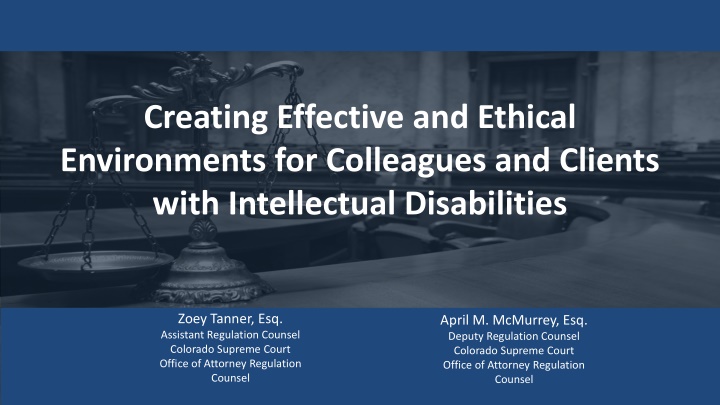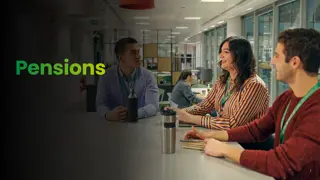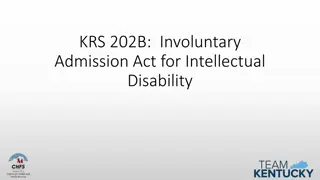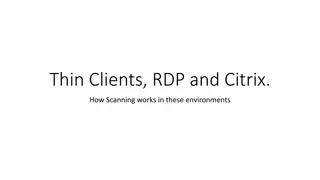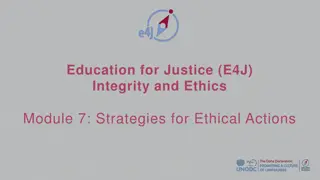Creating Effective and Ethical Environments for Colleagues and Clients with Intellectual Disabilities
Enhance inclusivity and professionalism in legal practice through creating environments that support colleagues and clients with intellectual disabilities. Uphold ethical standards, promote diversity, and ensure access to justice for all individuals. Commit to upholding the Colorado Attorney Oath of Admission and regulatory objectives for a fair and just legal system.
Download Presentation

Please find below an Image/Link to download the presentation.
The content on the website is provided AS IS for your information and personal use only. It may not be sold, licensed, or shared on other websites without obtaining consent from the author.If you encounter any issues during the download, it is possible that the publisher has removed the file from their server.
You are allowed to download the files provided on this website for personal or commercial use, subject to the condition that they are used lawfully. All files are the property of their respective owners.
The content on the website is provided AS IS for your information and personal use only. It may not be sold, licensed, or shared on other websites without obtaining consent from the author.
E N D
Presentation Transcript
Creating Effective and Ethical Environments for Colleagues and Clients with Intellectual Disabilities Zoey Tanner, Esq. Assistant Regulation Counsel Colorado Supreme Court Office of Attorney Regulation Counsel April M. McMurrey, Esq. Deputy Regulation Counsel Colorado Supreme Court Office of Attorney Regulation Counsel
Colorado Attorney Oath of Admission I DO SOLEMNLY SWEAR OR AFFIRM... I will support the Constitution of the United States and the Constitution of the State of Colorado; I will maintain the respect due to Courts and judicial officers; I will employ only such means as are consistent with truth and honor; I will treat all persons whom I encounter through my practice of law with fairness, courtesy, respect and honesty; I will use my knowledge of the law for the betterment of society and the improvement of the legal system; I will never reject, from any consideration personal to myself, the cause of the defenseless or oppressed; I will at all times faithfully and diligently adhere to the Colorado Rules of Professional Conduct.
REGULATORY OBJECTIVES PREAMBLE TO CHAPTERS 18 TO 20 In regulating the practice of law in Colorado in the public interest, the Court s objectives include: 6. Promoting access to justice and consumer choice in the availability and affordability of competent legal services; 8. Promoting diversity, inclusion, equality and freedom from discrimination in the delivery of legal services and the administration of justice
PREAMBLE AND SCOPE [14] The Rules of Professional Conduct are rules of reason. They should be interpreted with reference to the purposes of legal representation and of the law itself. Some of the Rules are imperatives, cast in the terms "shall" or "shall not." These define proper conduct for purposes of professional discipline. Others, generally cast in the term "may," are permissive and define areas under the Rules in which the lawyer has discretion to exercise professional judgment. No disciplinary action should be taken when the lawyer chooses not to act or acts within the bounds of such discretion. Other Rules define the nature of relationships between the lawyer and others. The Rules are thus partly obligatory and disciplinary and partly constructive and descriptive in that they define a lawyer's professional role. Many of the Comments use the term "should." Comments do not add obligations to the Rules but provide guidance for practicing in compliance with the Rules. [19] (provides in part) The Rules presuppose that disciplinary assessment of a lawyer's conduct will be made on the basis of the facts and circumstances as they existed at the time of the conduct in question and in recognition of the fact that a lawyer often has to act upon uncertain or incomplete evidence of the situation.
OARC ANALYSIS Rules implicated By clear and convincing evidence And also, importantly, lawyer s mental state and process. See ABA Standards for Imposing Lawyer Sanctions
Best practices Notate the file Include what steps you took to address the issue and what sources you reviewed/consulted
CLIENT CAPACITY AND THE RULES Colo. RPC 1.2 Scope of Representation and Allocation of Authority Between Client and Lawyer abide by client s decisions concerning the objectives of the representation, and as required by Rule 1.4, shall consult with the client as to the means by which they are to be pursued Colo. RPC 1.4 Communication (provides in part) (a) A lawyer shall: (1) promptly inform the client of any decision or circumstance with respect to which the client's informed consent, as defined in Rule 1.0(e), is required by these Rules; (2) reasonably consult with the client about the means by which the client's objectives are to be accomplished; Colo. RPC 1.0(e) Informed consent Denotes the agreement by a person to a proposed course of conduct after the lawyer has communicated adequate information and explanation about the material risks of and reasonably available alternatives to the proposed course of conduct.
IF YOU ARE CONCERNED ABOUT CLIENT CAPACITY, CONSIDER Do you have a process you routinely employ to assess capacity before the representation begins? Do you believe you are competent to assess the client s capacity? Colo. RPC 1.1 Competence What are your options if you re not? What are the tasks at hand? Does the client have capacity for those tasks? To the extent you believe the client has diminished capacity, what are your obligations?
COLO. RPC 1.14 CLIENT WITH DIMINISHED CAPACITY (a) When a client's capacity to make adequately considered decisions in connection with a representation is diminished, whether because of minority, mental impairment or for some other reason, the lawyer shall, as far as reasonably possible, maintain a normal client-lawyer relationship with the client. (b) When the lawyer reasonably believes that the client has diminished capacity, is at risk of substantial physical, financial or other harm unless action is taken and cannot adequately act in the client's own interest, the lawyer may take reasonably necessary protective action, including consulting with individuals or entities that have the ability to take action to protect the client and, in appropriate cases, seeking the appointment of a guardian ad litem, conservator or guardian. (c) Information relating to the representation of a client with diminished capacity is protected by Rule 1.6. When taking protective action pursuant to paragraph (b), the lawyer is impliedly authorized under Rule 1.6(a) to reveal information about the client, but only to the extent reasonably necessary to protect the client's interests.
FACTORS TO CONSIDER WHEN ASSESSING CAPACITY Colo. RPC 1.14, Cmt. 6 1. Client s ability to articulate reasoning leading to a decision; 2. Variability of state of mind and ability to appreciate consequences of a decision; 3. The substantive fairness of a decision; 4. The consistency of a decision with known long-term commitments and values of the client. In appropriate circumstances, the lawyer may seek guidance from an appropriate diagnostician.
COLO. RPC 14, CMT. 2 2. The fact that a client suffers a disability does not diminish the lawyer's obligation to treat the client with attention and respect. Even if the person has a legal representative, the lawyer should as far as possible accord the represented person the status of client, particularly in maintaining communication.
COLO. RPC 14, CMT. 3 3. The client may wish to have family members or other persons participate in discussions with the lawyer. When necessary to assist in the representation, the presence of such persons generally does not affect the applicability of the attorney-client evidentiary privilege. Nevertheless, the lawyer must keep the client's interests foremost and, except for protective action authorized under paragraph (b), must look to the client, and not family members, to make decisions on the client's behalf.
SUPPORTED DECISION-MAKING CRS 15-14-802 (5) Supported decision-making means a process in which an adult with a disability has made or is making decisions by using friends, family members, professionals, or other people the adult with a disability trusts to: (a) Help understand the issues and choices; (b) Answer questions; (c) Provide explanations in a language the adult with a disability understands; (d) Communicate the adult with a disability's decision to others, if necessary and if specifically requested by the adult with a disability; or (e) Facilitate the exercise of decisions regarding the adult with a disability's day-to-day health, safety, welfare, or financial affairs.
Ethics Opinions CBA Formal Ethics Op. 126 Representing the Adult Client with Diminished Capacity CBA Formal Ethics Op. 131 Representing Clients with Diminished Capacity Where the Subject of the Representation is the Client s Diminished Capacity
CBA Ethics Op. 126 Representing the Adult Client with Diminished Capacity: Duty to maintain normal client-lawyer relationship The duty to maintain a normal client lawyer relationship precludes a lawyer from acting solely as an arm of the court, using the lawyer s assessment of the best interests of the client to justify waiving the client s rights without consultation, divulging the client s confidences, disregarding the client s wishes, or presenting evidence against the client. See also Cmts. 1 and 2 to Colo. RPC 1.14
CBA Ethics Op. 126 Representing the Adult Client with Diminished Capacity: Assessing capacity The lawyer s effective and efficient representation of any client depends on the client s ability to receive, analyze, and process information and advice received from the lawyer, and to accurately inform the lawyer regarding information relevant to the representation. Lawyer should not confuse what may appear to be a client s imprudent or ill-considered decisions with decisions made by the client because of diminished capacity. Poor judgment does not warrant protective action.
CBA Ethics Op. 126 Representing the Adult Client with Diminished Capacity: Assessing capacity When assessing capacity, also consider: The degree of capacity required of the client to make adequately considered decisions concerning the scope and objectives of the representation, including giving informed consent to proposed actions, necessarily will depend upon the complexity of the factual and legal issue involved in those decisions. Consequently, the lawyer should assess the capacity of the client, and determine if the client suffers from diminished capacity, in the context of those complexities.
CBA Ethics Op. 126 Representing the Adult Client with Diminished Capacity: Medical Evaluation With regard to the lawyer s concern about the client s capacity, the lawyer can discuss those concerns with the client alone The lawyer can also recommend that the client obtain a doctor s written opinion about her mental abilities, which the lawyer can retain in the client s file as evidence of the client s capacity at or near the time of her execution of estate planning documents.
CBA Ethics Op. 126 Representing the Adult Client with Diminished Capacity: Seeking information/making disclosures to assess capacity Thus, if necessary, the lawyer may seek information and assistance from others, such as the client s family members or appropriate diagnosticians, in assessing the client s capacity to make decisions relating to the representation. The lawyer must take care to ensure that any information that the lawyer discloses in the process of assessing the client s capacity will not be used in a manner that is adverse to the client s best interests. Thus, the lawyer should not disclose client information to persons whose interests are adverse or potentially adverse to those of the client.
PROSPECTIVE CLIENT What if you decide not to represent the client? CBA Ethics Op. 126 explains that when a lawyer becomes aware during the first meeting that a client may not have capacity to enter into a client-lawyer relationship, the lawyer should consider obligations pursuant to Colo. RPC 1.18, and may consider and discuss with the prospective client the establishment of a conservatorship or guardianship.
CBA Ethics Op. 126 Representing the Adult Client with Diminished Capacity: Taking protective action The lawyer must reasonably believe that the client (1) has diminished capacity, (2) is at risk of substantial physical, financial or other harm unless protective action is taken, and (3) cannot adequately act in the client s own interest. Under Rule 1.0(i), a reasonable belief means that the lawyer believes the matter in question and that the circumstances are such that the belief is reasonable. Thus, while leaving to the lawyer s discretion whether or not to take protective action, Rule 1.14(b) establishes the three conditions precedent enumerated above, to taking protective action, and each of those preconditions must satisfy the objective standard of reasonable belief by the lawyer.
CBA Ethics Op. 126 Representing the Adult Client with Diminished Capacity: Taking protective action and communicating with the client In such event, before taking such action, the lawyer should explain and discuss with the client the lawyer s reasons and considerations in proposing such action and describe and explain what steps would be taken in effecting such action. If the client opposes or objects to the proposed protective action and such opposition and objections cannot be resolved, the lawyer should consider whether withdrawal from representation is required.
CBA Ethics Op. 126 Representing the Adult Client with Diminished Capacity: Reasonably necessary action The lawyer should be guided by the client s best interests and the goals of intruding into the client s decision making autonomy to the least extent feasible, maximizing client respecting the client s family and social connections. See Cmt. 5 to Colo. RPC 1.14 capacities and
CBA Ethics Op. 126 Representing the Adult Client with Diminished Capacity: Reasonably necessary action communicating with the client The lawyer still has a duty to communicate and consult with the client. This may entail special efforts on the part of the lawyer to communicate in a manner that will allow the client to make those decisions concerning the representation that the client s capacity permits. See also CBA Ethics Op. 131 A lawyer representing an allegedly incapacitated person, should adjust his or her interview and communication style so that the allegedly incapacitated client can understand the information provided by the lawyer to the fullest extent possible The lawyer may also adjust his or her communication technique by accepting the assistance of a third party who enjoys the special confidence of the allegedly incapacitated person. CBA Ethics Op. 131 Representing Clients With Diminished Capacity Where the Subject of the Representation is the Client s Diminished Capacity, and also Colo. RPC 1.14, Cmt. 3. Lawyer may modify or simplify language, use written memoranda to summarize conversations to aid client in understanding, and may elect to identify times of day that client is at greatest level of capacity to communicate. CBA Ethics Op. 131
CBA Ethics Op. 126 Representing the Adult Client with Diminished Capacity: Reasonably necessary action communicating with other parties When the client needs assistance in making adequately considered decisions regarding the representation, the lawyer may find it useful and appropriate to involve persons whose natural interests are congruent with those of the client, such as trusted family members who may be in a position to help the client make decisions.
CBA Ethics Op. 126 Representing the Adult Client with Diminished Capacity: Reasonably necessary action communicating with other parties If another person becomes involved to assist the client in making the necessary decisions, then, to protect the attorney client privilege, the lawyer s consultation with that person should preferably take place out of the client s presence, with the lawyer keeping the client separately informed about the consultation. However, the client may wish to have family members or other persons participate in discussions with the lawyer. When necessary to assist in the representation, the presence of such persons might not vitiate the attorney client privilege but the lawyer should take care to avoid an unintended waiver of the privilege.
CBA Ethics Op. 126 Representing the Adult Client with Diminished Capacity: Other considerations Lawyer may consider other documents establishing agency for the client, but the lawyer must be satisfied that the client had the ability to understand the import of that grant at the time the client made it. Lawyer should become familiar with social agencies and support groups that may be able to provide assistance to the client in making decisions with respect to matters within their areas of service and should be prepared to advise the client regarding their services. For more severe situations, the lawyer should advise the client regarding the appointment of a guardian ad litem and/or conservator. Lawyer should not seek to be appointed as GAL, except when immediate and irreparable harm will result from the slightest delay. Even then, the appointment should be temporary.
CBA Ethics Op. 126 Representing the Adult Client with Diminished Capacity: Disclosure of information Colo. RPC 1.14(c) makes disclosure discretionary. The limit for disclosure is what is reasonably necessary to protect the client s interests. Cmt. 8 to Rule 1.14: Disclosure of the client's diminished capacity could adversely affect the client's interests. For example, raising the question of diminished capacity could, in some circumstances, lead to proceedings for involuntary commitment. Information relating to the representation is protected by Rule 1.6. Therefore, unless authorized to do so, the lawyer may not disclose such information. When taking protective action pursuant to paragraph (b), the lawyer is impliedly authorized to make the necessary disclosures, even when the client directs the lawyer to the contrary. Nevertheless, given the risks of disclosure, paragraph (c) limits what the lawyer may disclose in consulting with other individuals or entities or seeking the appointment of a legal representative. At the very least, the lawyer should determine whether it is likely that the person or entity consulted with will act adversely to the client's interests before discussing matters related to the client. The lawyer's position in such cases is an unavoidably difficult one.
CBA Ethics Op. 126 Representing the Adult Client with Diminished Capacity: Disclosure of information The lawyer for the client with diminished capacity should first seek the client s informed consent to disclosure of information in the course of protective action and should explain to the client the information to be disclosed and the lawyer s reasons for seeking permission to disclose such information. If the client refuses to consent to disclosure or objects to disclosure, the lawyer should give respect and consideration to the client s objections and should make reasonable efforts to assuage the client s concerns in order to obtain the client s informed consent.
CBA Ethics Op. 126 Representing the Adult Client with Diminished Capacity: Termination of the representation What if the client disagrees with the proposed protective measures? See Colo. RPC 1.7(a)(2) and Colo. RPC 1.16: has the disagreement created an irreconcilable conflict requiring you to withdraw? If the lawyer seeks protective action contrary to the direction of the client, then the lawyer s interests are probably adverse to those of the client, and the lawyer cannot represent the client in the protective proceedings and possibly not thereafter in the underlying representation.
RESOURCES Office of Attorney Regulation Counsel coloradosupremecourt.com Colorado Lawyer Assistance Program (COLAP) coloradolap.org Colorado Attorney Mentoring Program (CAMP) coloradomentoring.org Colorado Bar Association: cobar.org Law Practice Management Casemaker Member benefits Ethics Hotline 303-860-1115
